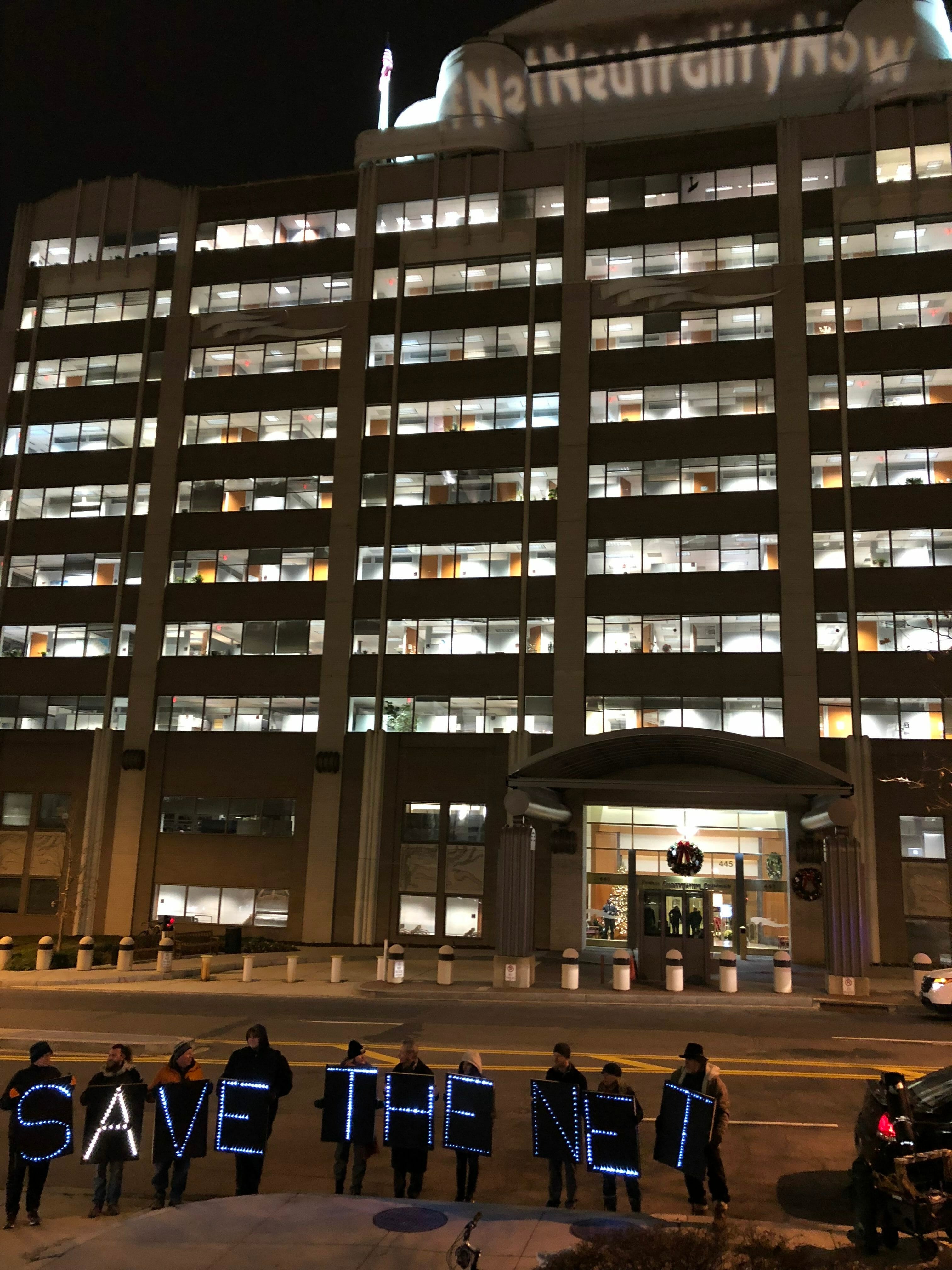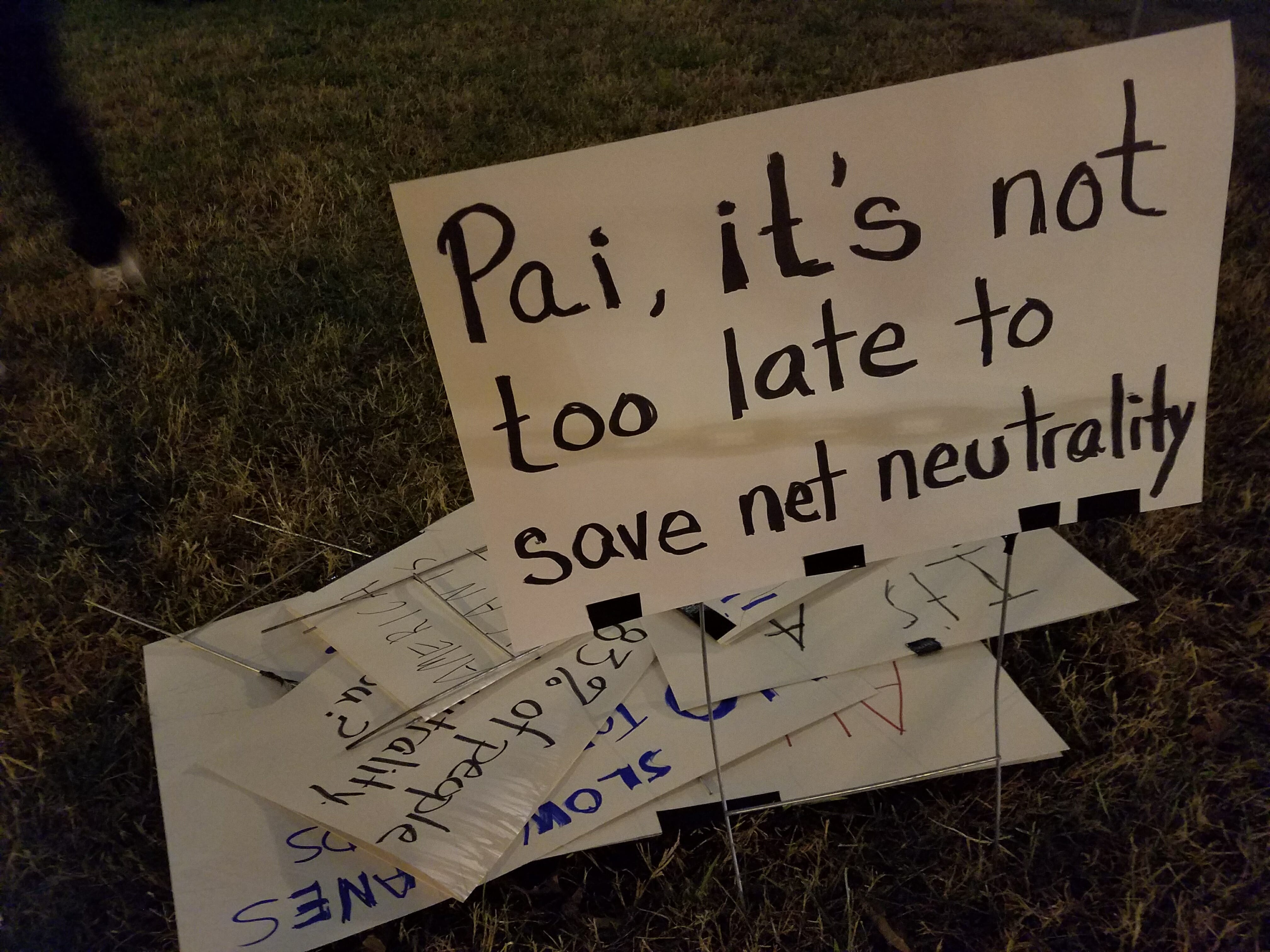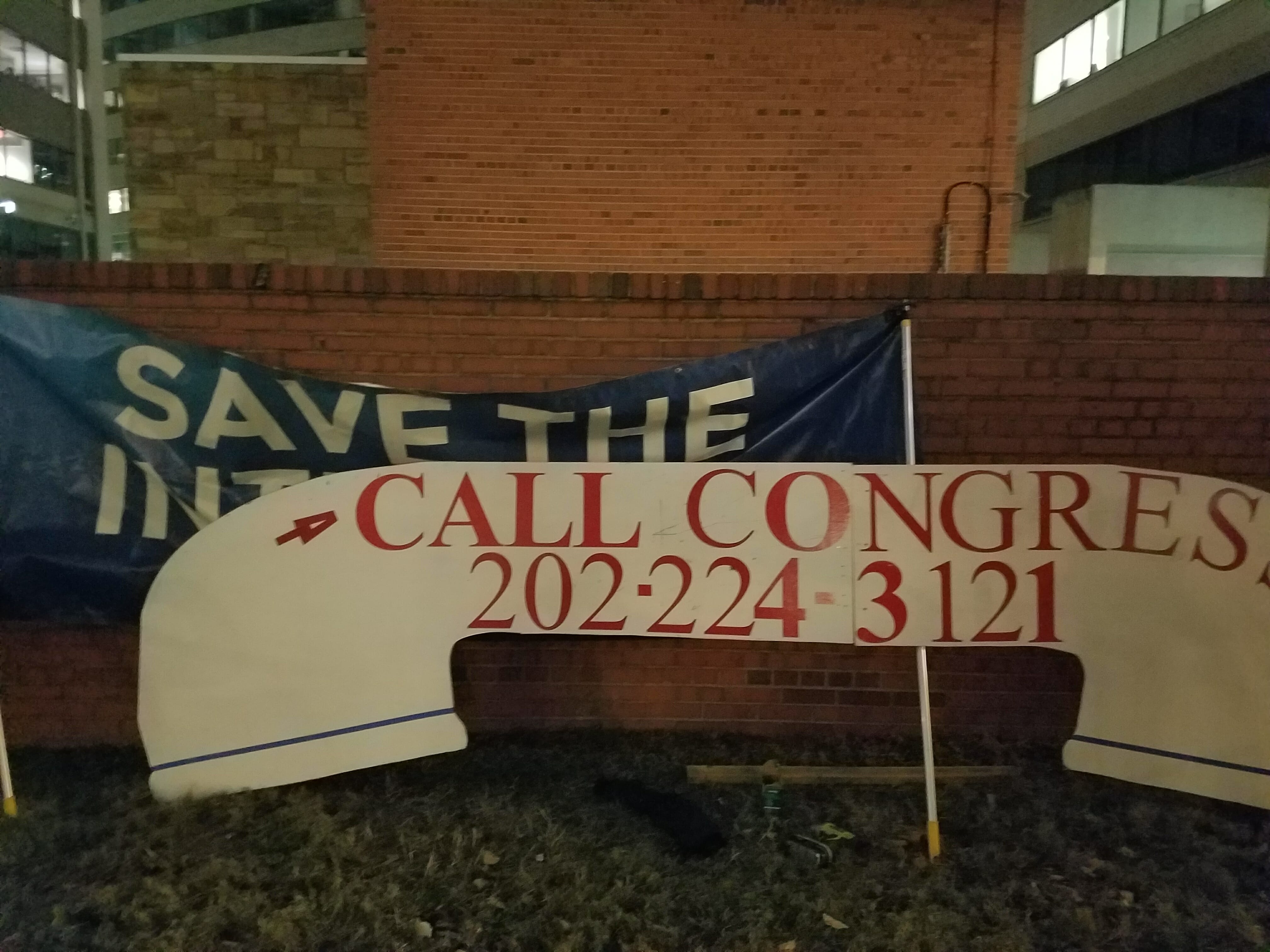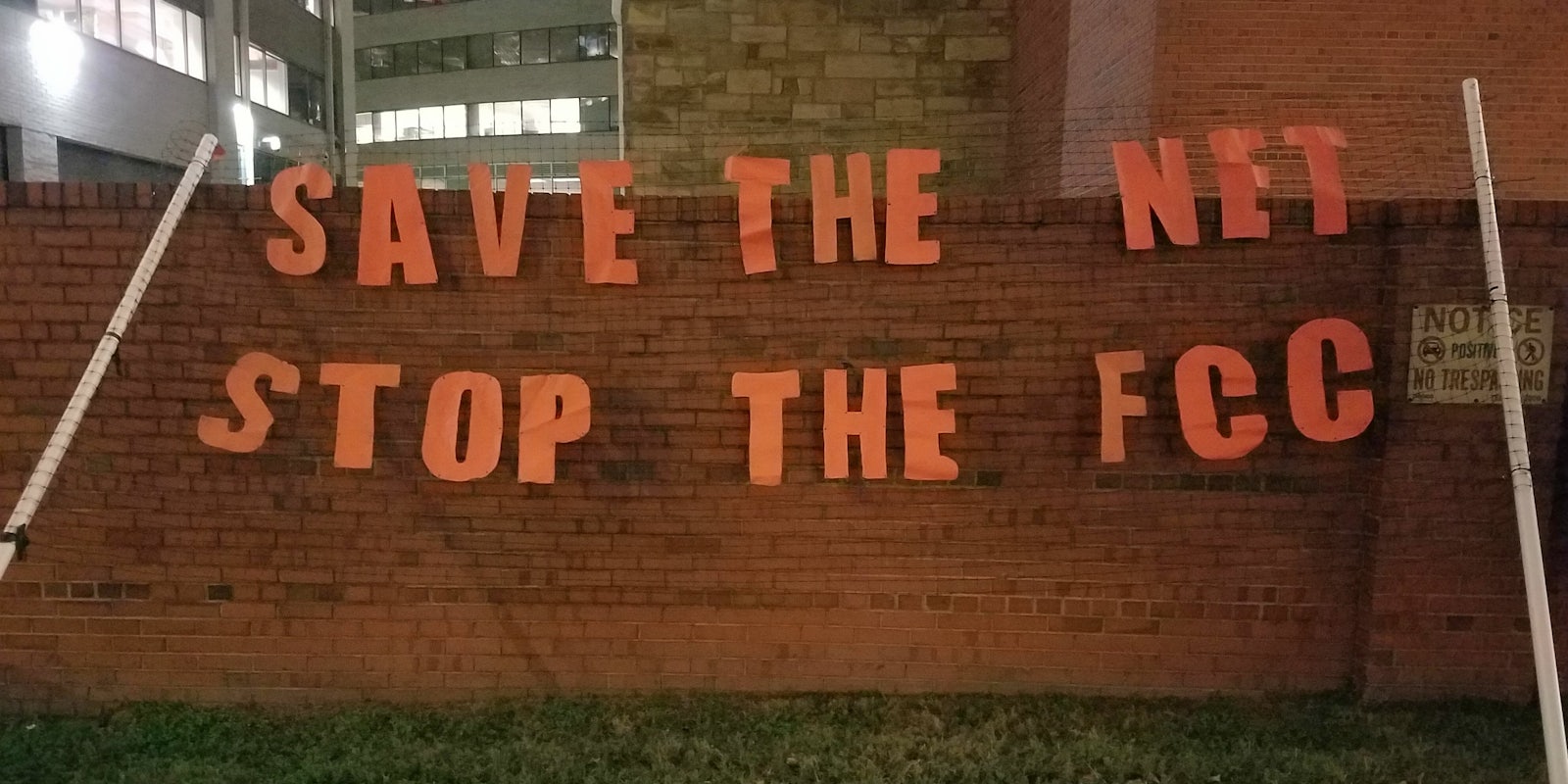It’s a blisteringly cold night in Washington, D.C., a little after 9pm. It snowed briefly, just long enough to make its presence felt, and outside the Federal Communications Commission (FCC) headquarters, Margaret Flowers is making another protest sign. This one is addressed to chairman Ajit Pai: “It’s not too late to save net neutrality.”
“We’re elves decorating the FCC,” says Flowers, an activist and co-director of the social justice organization Popular Resistance, with a smile. “When the employees come in, we want them to see our message.”
It would be hard to miss. Large, lighted letters spelling out “SAVE THE NET” line the sidewalk while banners large enough for a parade rest against a brick wall. Earlier in the afternoon, a projection system beamed messages like “no slow lanes” and “open & equal internet for all” onto the building itself. And there are dozens upon dozens of signs, many of them just angry emoji, waiting to held by protestors.

It’s the last night of net neutrality, the foundational principle of the open internet that states that all web traffic should be treated equally, and a dozen or so activists are huddled—as much for warmth as they are for protesting—outside the building where its repeal will be voted on Dec. 14. Most of them are planning on staying the night in a couple of tents as part of an “overnight vigil,” organized via Facebook, though some, like Arjun Singh, who drove down for the protest from New Jersey, are staying at nearby hotels.
“I don’t want the internet to turn into a propaganda medium,” he says when asked what inspired the trip.
“To me personally, it’s important because my work is populated through the internet,” adds Eleanor Goldfield, a D.C. resident and freelance journalist, who’s working with Popular Resistance for the event. “I need net neutrality to get past the corporate roadblocks. And as an organizer, it’s really important to connect with the community and to make sure the marginalized people who have historically had their voices repressed have the ability to tell their own stories, without a filter.”
Reinforcements will come in the morning. A coalition of internet freedom activists is expected to gather at 9am for what’s being billed as a “Wake-Up Call” to save the internet. Scheduled speakers include Sen. Edward Markey (D-Mass.) and a trio of representatives—Keith Ellison (D-Minn.), Ro Khanna (D-Calif.), and Maxine Waters (D-Calif.)—as well as Insecure actress and activist Amanda Seales and members of the Electronic Frontier Foundation and Planned Parenthood Action Fund, among others.
But that’s still hours away, and there are more pressing concerns—namely, staying warm. Everyone is bundled—sweaters, scarves, gloves, jackets, and beanies—and someone notes that they have a bucket full of hand warmers.
“We’re going to get cozy,” Goldfield jokes.

This is actually not the first time Flowers has spent the night at the FCC. In May 2014, she camped out for eight straight days on the grounds in the lead up to what ultimately resulted in the 2015 Open Internet Order, which reclassified broadband providers as “common carriers” under Title II of the Communications Act. That’s a complicated way of saying it codified net neutrality protections and gave the FCC the authority to regulate internet service providers (ISPs).
On Dec. 14, the FCC will vote to essentially roll back net neutrality protections, which prohibit ISPs from blocking legal content, throttling web traffic from particular sources, or creating internet “fast lanes,” where providers could speed up some forms of internet traffic over others for those who pay additional fees. (Outside of censorship concerns, critics worry that doing so would ramp up the cost of doing business and make it for difficult for emerging startups and small businesses to compete in the market. In fact, more than 800 startups sent a letter to the FCC in April urging it maintain net neutrality protections.)
Pai’s proposal has been met with incredible and nearly universal backlash. Thousands of people rallied at Verizon stores across the U.S. on Dec. 7; internet rights group Fight for the Future hosted a massive online protest on Tuesday that attracted the support of the web’s most popular sites; and more than 100,000 people have signed a We the People petition calling for Pai’s resignation.
There’s little doubt, however, even among those gathered here, about tomorrow’s eventual outcome. The vote will be determined by the FCC’s five-member leadership board, and the board’s three Republican members—Pai; Brendan Carr, a former telecom lawyer; and Michael O’Reilly, a longtime critic of net neutrality—do not appear to be budging.
At this point, there’s little hope that the vote will be delayed, either. Thirty-nine senators (all Democrats) signed a letter to Pai requesting the FCC scrap its plan to gut net neutrality. That was followed by a request by 117 members of Congress for the FCC to “delay consideration” of the repeal. Pai seemingly answered both by releasing a video trolling his critics.

In short, it would take a miracle for things to break in favor of net neutrality, but those gathered are still warming their hands and cheerfully making signs. The latest one declares “Pai for sale,” with a drawing of a baked pie that looks more like an above-ground swimming pool.
“We know what we’re up against,” Flowers said. “I don’t think [Pai’s] going to come to his senses, but we want our voice to be heard.
She continues: “I live my life by the motto, ‘If you’re silent, you’re complicit.’”
“Regardless of what happens tomorrow,” Goldfield adds, “the fight is not over.”
Goldfield outlined a three-tier approach of what will likely come next: The first will be legal challenges to the FCC order, which could delay its implementation for months if not years. The second will be lobbying for major changes to the Telecommunications Act of 1996 to update it for the modern social web and internet of things, and thirdly, a grassroots effort away from corporate ISPs and toward municipal broadband and other alternatives.
If there’s one thing that’s clear, as those gathered hunker down for the evening, it’s that they’re in this for the long haul.
“People should not feel deflated,” Goldfield says. “But if they were just watching from the sidelines, I think it’s important for them to ask themselves: What will it take for me to engage—to fight to preserve my freedom of speech in the digital age.”


